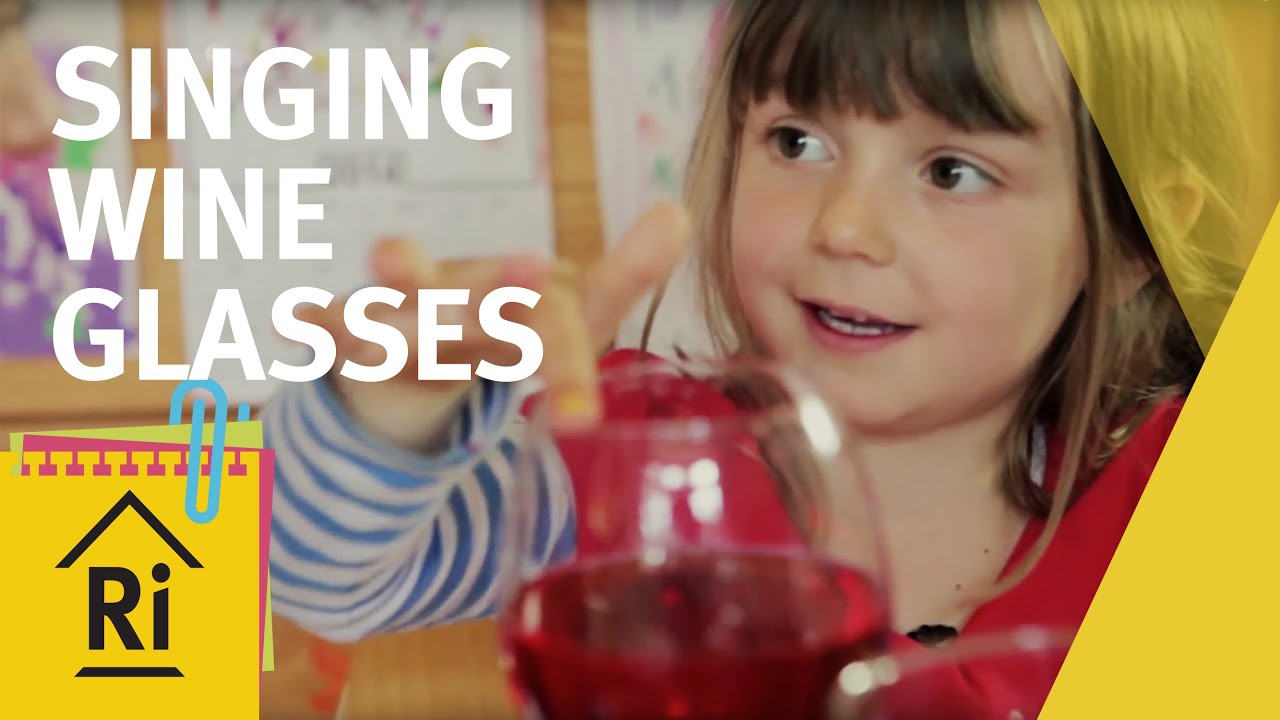The Royal Institution
Create a wine glass orchestra in your kitchen and explore how sound is caused by vibrations.
For more ideas, and to download an info sheet click here:
http://www.rigb.org/families/experimental/singing-wine-glasses
Marieke and Tilly experiment with making music and doing science experiments at home. Using wine glasses filled with different volumes of liquids, they investigate how sounds are caused by vibrations and how changing the volume of liquid affects the pitch of the note. Simply rubbing your fingers around the rim of a glass can make an amazing noise. Explore sound, music and science in this fun activity to do with kids.
With enough glasses and little bit of practice you might be able to play ‘Ode to Joy’ like Marieke!
ExpeRimental, brought to you by the Royal Institution of Great Britain, is a series of free short films that make it fun, easy and cheap to do science at home with children aged 4 to 10. Our films give you lots of ideas for kids’ activities that will help you explore the world around you, question and experiment together. We’ll show you how to do the activity and how to make sure adults and children get the most out of it. Why not have a go and then tell us what you think on our Facebook page? https://www.facebook.com/Ri.ExpeRimental
Click here to download this activity’s info sheet: http://bit.ly/SWGInfoSheet
For more information, visit http://rigb.org/experimental
The Ri is on Twitter: http://twitter.com/ri_science
and Facebook: http://www.facebook.com/royalinstitution
and Tumblr: http://ri-science.tumblr.com/
Our editorial policy: http://www.rigb.org/home/editorial-policy
Subscribe for the latest science videos: http://bit.ly/RiNewsletter
Source




This is just great science to share with kids. Really neat to see their minds light up and the critical thinking skills grow.
NEW ExpeRimental FILM: Singing wine glasses
In this week's ExpeRimental, Marieke and her daughter Tilly make a wine glass orchestra and explore the science of how sound is caused by vibrations.
Watch the video, then download the info sheet for more ideas here:http://bit.ly/SWGInfoSheet
http://youtu.be/FNTmzX3GpOU
#science #activities #holidays
That is so delighful I love this. Ode of Joy is on of my favourite music ^^
This is such a great experiment. We also did a video on this topic a little while ago. I love how the young children in your videos get to experiment and explore the topic. It really helps to show how enjoyable science can be.
Hey so it's pretty hard to get noticed on youtube but I was really hoping you guys and girls would give my channel a chance. I make educational videos to help students. You don't even have to subscribe if you don't want to but if you took a look it would mean a lot to me! Thanks so much in advance!
00:25 reminds me of:
Bratislava tram
Not really musical and certainly not enjoyable, but at least something you will not forget… And hearing those glasses, it came right into my mind… But they installed rail lubrication at both tunel exits recently and the noise is eliminated. I hope they will install these lubrication points all over the city, it is a shame that the trams are so noisy. Partly due to the specific wheel profile and big tolerances in the shape, also some parts of the network have a poor geometry resulting in higher noise. But there are so many factors (temparature, humidity, specific wheel profile of the tram you hear, tolerances in track geometry) that you cannot get one profile that will be always noiseless (althought there is one theoretical wheel/rail profile with minimal noise, but that is only in theory and only for one specific bogie or tram type). The best is to lubricate. Either the flanges on the trams directly or the tracks at specific points. I support track lubrication on critical areas, there are not many tight curves in Bratisalva. Vienna has lubricated all curves and the trams are essentialy noiseless thanks to that. I wonder how much lubricant is spent each day in the huge tram network in Vienna. I suspect that it must be at least one big barrel. Each month a big truckload of barrels with lubricant.
I personally do not like that noise, especially when the tone is close to the noise of the trams passing curves with which I am too familiar. It can be musical for somebody, but I have a different association with that sound.
Awesome ending. That sounded beautiful.
寓教于乐!
What does the morse code say at 1:20 ??
awsome
cool